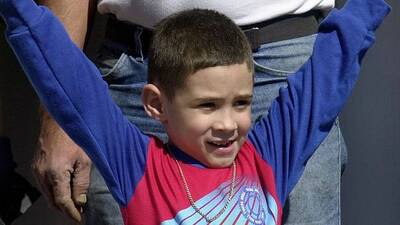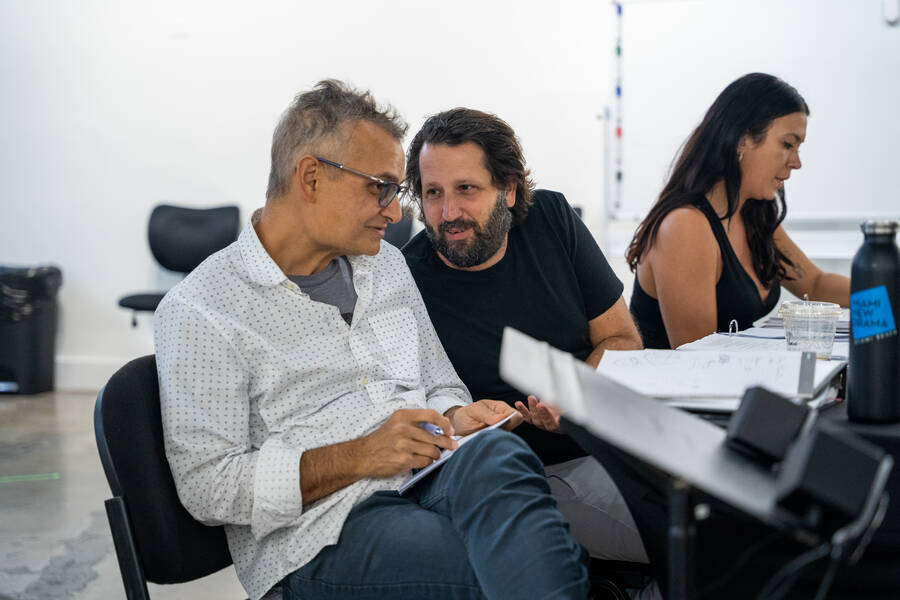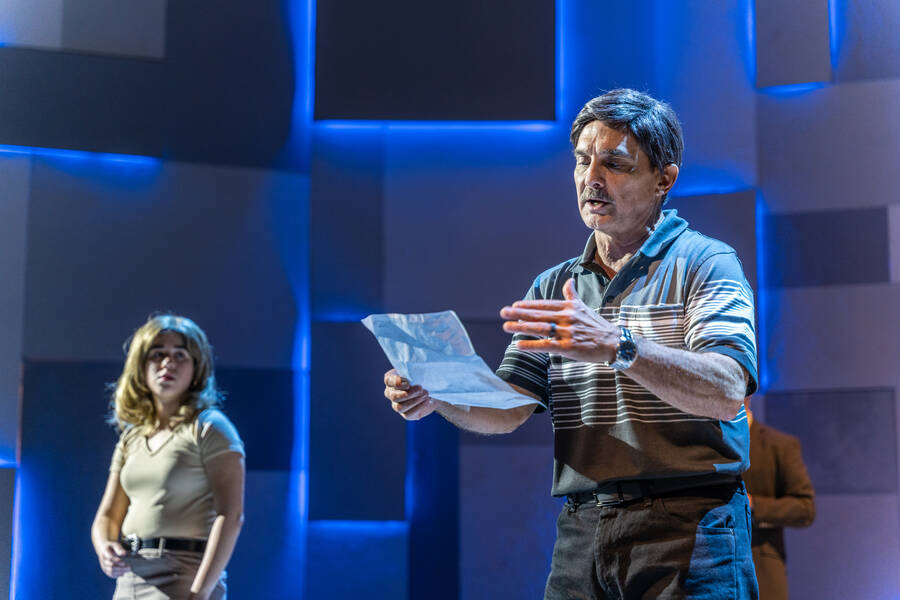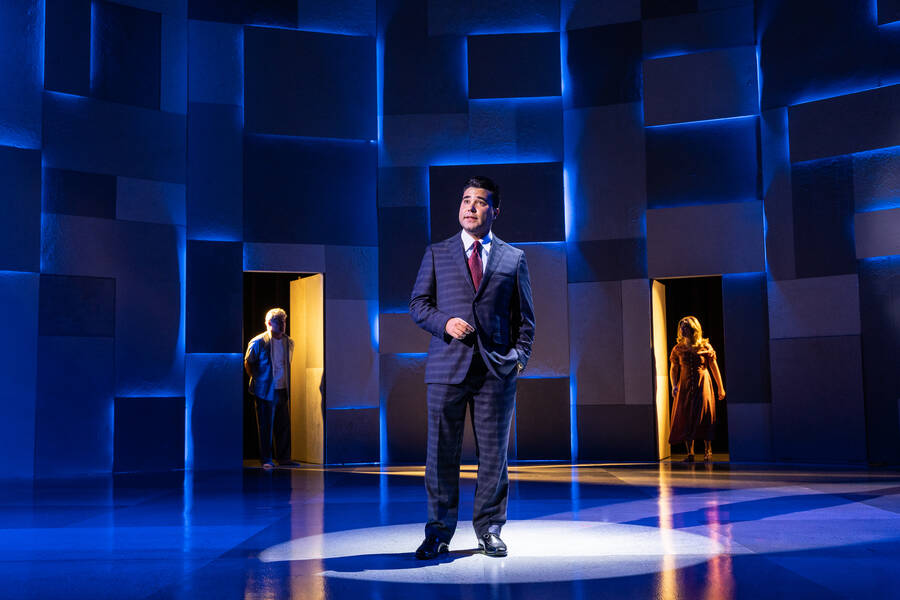Nearly a quarter of a century ago, on Nov. 25, 1999, while many Americans were watching a Thanksgiving Day parade and football, two fishermen rescued a 5-year-old Cuban boy, Elián González, as he clung to an inner tube three miles off the coast of Ft. Lauderdale, Fla. He was among the few survivors of an attempt by a group of Cuban nationals to cross to the U.S. in a faulty boat; his mother and 10 others had drowned in the effort.

His rescue sparked an international custody battle that played out each day on the news. Almost 23 years later, it’s the subject of Rogelio Martinez’s new play Elián, which runs Oct. 27-Nov. 20 at Miami New Drama in Florida, in the city where the drama unfolded. It’s the place where, the day after his rescue, Elián went to live with his uncle and other relatives. The Cuban government, and Elián’s father, wanted him back in Cuba, while the U.S. and his stateside family claimed him. The battle stoked lingering Cold War resentments between communist Cuba and the U.S.
“It’s very dramatic stuff,” said Michel Hausmann, Miami New Drama’s artistic director, who is also directing Elián, in a phone interview during a break from rehearsals. And, in line with the theatre’s mission to make work in conversation with its city’s unique multicultural and multilingual community, which has led them to produce Billy Corben and Aurin Squire’s Confessions of a Cocaine Cowboy and Carmen Pelaez’s The Cuban Vote, among other plays, Hausmann said he has long wanted to bring Elián’s story to Miami New Drama. Every time he mentions Elián among the city’s Cuban community, Hausmann said, “It feels like it’s an unhealed wound it’s hard for people to want to return to. We felt a huge responsibility to bring the story of these events and the story of the community in a way that honors the truth that the community feels was robbed from them.” In particular he wanted a play that would get beyond the “media circus” that played out in 1999 and 2000 to reckon with both the emotional and political sides of Elián’s story.
He found the perfect collaborator in Martinez, he said. The two were introduced a few years ago by a mutual friend, who thought Miami New Drama was a good home for a play of Martinez’s called Come As You Are. Miami New Drama produced a workshop of it, and then in December 2020 included Martinez among the playwrights of 7 Deadly Sins, seven commissioned short plays, each focused on one deadly sin, in vacant storefronts along Miami Beach’s Lincoln Road (where the theatre is also located). It was among the most ambitious in-person professional theatre productions at that stage of COVID-19 pandemic.
What made Martinez the ideal playwright to tell Elián’s story, though, was his own background. Like Elián, Martinez came with his mother to the U.S. from Cuba; he turned nine a few days before he got on the boat to Miami during the Mariel boatlift in 1980. He was supposed to come with his father and grandmother as well, but at the last minute military police came and told his father he was not allowed to leave the country because he had a degree from the University of Havana. His parents then had to make a decision: Would they stay as a family or leave his father in Cuba? His father decided to let them go. Years later, the marriage ended in divorce. Martinez only saw his father twice after leaving Cuba.
“He could have put his foot down at that moment,” Martinez reflected in a phone interview. “He could have said no. That’s a difficult thing to wrestle with as a child, as a teenager, as a young adult, and now as a father. It wasn’t until I became a father that I could see the world from my father’s point of view. I could see how painful it must have been to let go. I didn’t understand that. Decisions that change lives forever are what drama’s about.”

This experience led Martinez to focus many of his plays on the decades-long conflict between the U.S. and the Soviet Union. Born in East Berlin took its inspiration from Bruce Springsteen’s legendary concert in East Germany in 1988, a year before the Wall came down, and was first performed at the Stasi Museum in Berlin in 2019 before premiering at the San Francisco Playhouse in 2020. In Blind Date, which premiered at the Goodman Theatre in 2018, Martinez portrayed a summit between Ronald Reagan and Mikhail Gorbachev meeting to halt the arms race. And When Tang Met Laika, which premiered at the Denver Center Theatre in 2010, follows a group of former Cold War adversaries as they work together on the International Space Station.
“The Cold War changed the course of my life forever,” Martinez said. “One day I was living in Cuba with my family—father, mother, grandmothers—and the next I was living in the United States, fleeing political repression and retribution. Until I first started to deal with the politics of the period on paper, I was wrestling with trauma that had not been dealt with properly.”
Elián continues this exploration, both politically and personally. As Hausmann pointed out, while the Cold War ostensibly ended with the fall of the Berlin Wall and the collapse of the Soviet Union, “For Cuban Americans in Miami and for Cubans in Havana, the Cold War was alive and kicking” in 1999.
When Martinez arrived in the United States, he lived briefly in Miami with relatives, then with other relatives in Michigan, until the family finally settled in Union City, N.J., which had the largest concentration of Cuban Americans of any U.S. city outside of Miami. Referred to as “Little Havana on the Hudson,” Union City had a Cuban American population of roughly 15,000 by 1994. His return to Miami for Elián is a sort of homecoming for him, though there’s an even deeper return going on.
“When I hear Spanish in my play, I become emotional,” Martinez said. “I realize just how much I’ve missed hearing it. My previous four plays had no Spanish, while all my early work had Spanish.”

Hausmann and Martinez have been working on Elián since the start of the pandemic in March of 2020. In that time Miami New Drama sent Martinez to meet members of the community and community leaders, including Manny Diaz, the lawyer for the González family; Pepe Hernandez, the president of the Cuban American National Foundation; Alex Penelas, the mayor of Miami-Dade County at the time; Marty Baron, the editor of the Miami Herald at the time; and Carlos de la Cruz, a community leader asked by U.S. Attorney General Janet Reno to help in the negotiation.
Martinez’s background as a journalist proved helpful in this research. What he learned in these conversations was that there was a more complex story than the one that was told in the media at the time.
“We did a deep dive and immersed ourselves investigating the events we are telling,” Hausmann said. “We feel it’s a scoop. It’s a perspective that has never been told before.”
Some of the inaccuracies they found in old TV news footage and newspapers, both from the U.S. and Cuba, centered on Elián’s relationship to his U.S. family in the United States. The media portrayed Elián as entering a house of strangers in Miami, but he most likely knew his relatives and had spent time with his great uncle in Cuba before he came to the U.S.
The play has a large cast of characters from politics, the media, and the González family. Martinez said his propensity for large casts is inspired by his love of Robert Altman’s films, particularly Nashville, in which multiple storylines all lead to one big convergent moment. But one major character never appears onstage: Elián himself. This absence may be meant to make audiences reflect on the way he was used as a symbol by many people and political actors at the time. “We’re making a theatrical choice,” Martinez conceded. “If we were doing this for television it would be a different choice, and probably the child would be there.”
For his part, Hausmann likened Elián to Sophocles’s Antigone, in which a central character, Polyneices, is offstage and the focus is on the wrangling over what to do with his body.
“What makes Antigone such a good play?” Hausmann mused. “The answer to that I think is that you have someone like Creon who created a law, the law says you can’t bury a traitor. He’s right, it’s the law, it makes sense. But you have somebody like Antigone who says, ‘Well, this is my brother. You have to bury him, even if it’s against the law, it’s the right thing to do—the law is wrong.’ So you can argue both sides. With Elián you have something similar in the community, where you have somebody who says a child belongs to his father, and the other argument is that, yes, the mother gave her life so that her child could be in a free society. I think that the exploration of both is what makes great theatre.”
Elián’s saga lasted about six months, from late November of 1999 until April of 2000, when, during a pre-dawn raid, armed U.S. federal agents seized Elián from his relatives’ home and reunited him with his father, who took him back to Cuba two months later. During those two months, there were court proceedings and demonstrations and counter-demonstrations in Miami that were covered as part of the 24-hour news cycle. Now, 23 years later, González works for a state-run company in Cuba and has started a family of his own there. It would seem that he’s done his share of reckoning with the events of his childhood. Now Elián offers a chance for Miami to do its own reckoning with his brief time there.
Shoshana Greenberg (she/her) is a writer based in New York City.


